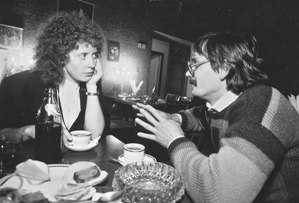Choices in Writing Memoirs and Family History
Biff Barnes
When you decide to write a memoir or family history book you may find yourself facing a large pile of memories and memorabilia, photos and documents, not to mention the sometimes not so reliable memories of friends and relatives.
Award-winning journalist Laurie Hertzel, now book editor of the Minneapolis Star Tribune, confronted the same problem when she decided to write News to Me, her memoir of twenty years as a reporter at the Duluth News Tribune. The decisions she made offer some useful guidance for anyone undertaking a book of their own.

Hertzel began by deciding on exactly what the purpose of her book should be. ”I started thinking about all the things about old-time newspapers that people nowadays know nothing about,” she said. “Horseshoe-shaped copy desks – those are gone. Editing on paper with the time-honored editing marks – that’s gone. Cropping photos with a cropping wheel and a pica pole – all of this is gone. I wanted to remember them, and I wanted people to remember them.”
Having fixed her purpose, Hertzel could decide what to include in the book. And what to leave out. “I left out a lot, she said. “I didn’t write much about my family, I didn’t write much about my private life. This wasn’t a book about how I got married and got divorced.”
Hertzel said, “I tried to structure it by pivotal moments in my career, so it was structured job by job by job.” But even then, she had to make choices about which details of her career to include. ” The tricky part is figuring out what parts of your life to tell that keep moving the story of your life forward,” said Hertzel. “And that was trial and error.”
Hertzel’s experience illustrates the need to make choices in writing any kind of personal history. At the heart of creating a successful book is the decision of what story you want to tell. Once you have made that decision you can take control of all the memories and material you might draw upon and make decisions about what to use.
Laurie Hertzel’s remarks appeared in an interview with Andrea Pitzer on the website Nieman Storyboard maintained by the Nieman Foundation for Journalism at Harvard.
Click here to read the full interview.